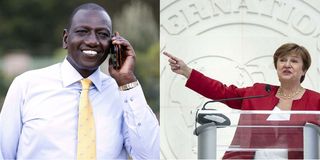Premium
Ruto spoke to IMF chief after withdrawing Finance Bill, sources say

Kenyan President William Ruto spoke by phone with International Monetary Fund chief Kristalina Georgieva in the days after he withdrew $2.7 billion in proposed tax hikes in response to deadly protests, two diplomatic sources told Reuters.
President William Ruto spoke by phone with International Monetary Fund chief Kristalina Georgieva days after he withdrew Finance Bill, 2024 in response to deadly nationwide protests against tax hikes.
Two diplomatic sources, who sought anonymity, confirmed the phone conversation on a day the President chaired a crisis Cabinet where he instructed the National Treasury to reorganise the budget to accommodate the Sh300 billion budget gap.
According to the sources, there was agreement among major donors that the IMF needed to show flexibility on programme targets as Kenya looked to fill the gap caused by the bill's withdrawal.
Further, one of the sources added that the government should show a commitment to reducing wasteful spending, cracking down on corruption and increasing accountability in exchange for that flexibility.
The Cabinet meeting Thursday is said to have discussed major austerity measures, according to a Cabinet Secretary who spoke with ‘Nation’ in confidence.
“We have agreed that we are going to implement austerity measures and budget cuts to balance the shortfall occasioned by the withdrawal of the Finance Bill,” said the CS.
A Cabinet dispatch indicated that there will be substantial cutting down of budgets to “balance between what to be implemented and what can wait”, and ensuring that key national programmes are not affected.
“Our plan is good and solid and, in the fullness of time, we shall be vindicated,” President Ruto said at the Cabinet meeting.
Luxury and extravagance
There has been a general feeling that the country has an expenditure problem.
Some of the revenue raised goes into wastage through corruption and to finance luxury and extravagance among top government officials.
On the day Dr Ruto climbed down by dropping the Finance Bill, he proposed budget cuts in the three arms of government as well as county governments.
“I direct immediate further austerity measures to reduce expenditure, starting with the Executive Office of the President and extending to the entire executive arm of government. I direct that operational expenditure in the Presidency be reduced to remove allocations for the confidential vote, reduce travel budget, hospitality and purchase of motor vehicles, renovations and other expenditures,” said President Ruto.
The IMF has been pushing Dr Ruto to cut unnecessary expenditures on top of raising more taxes to finance its operations and service existing loans. IMF had foresaw the emergence of street protests against the tax measures but asked the government to stand firm on new revenue-raising measures.
Lending programme
The finance bill containing the tax increases was central to policy reforms agreed by Kenya with the IMF as part of a lending programme worth $3.6 billion (Sh463 billion)
Analysts say its withdrawal a week ago is likely to result in the country missing key programme targets, although the government does not urgently need cash from the IMF after it was able this year to repay a bond that was originally worth $2 billion by issuing a new seven-year bond.
The IMF has been a major target of the ire of young Kenyan protesters, who have accused it of being the driving force behind the proposed tax hikes.
The IMF reached a staff-level agreement with Kenya in early June on a policy package needed to complete the lending programme's seventh review, expected to unlock a disbursement of several hundred million dollars, but the deal has not yet received approval from the fund's Executive Board.
"We remain deeply concerned by the recent tragic events in Kenya and maintain close ongoing and constructive dialogue with the Kenyan authorities," an IMF spokesperson said when asked about the call.
State House spokesman Hussein Mohamed did not pick up calls from a Nation reporter on the matter.
The reporter also sent him a text message: "Hello Hussein...reaching out for a confirmation about a phone call between the President and IMF chief Georgieva. Please call me back when you have a moment, we're working on this story for publication on nation.africa." It was not responded to by publishing time.
Since shelving the bill, Ruto has pledged to include austerity measures in a supplemental budget but has also suggested that the government will need to significantly increase borrowing in the 2024/25 fiscal year.
An IMF spokesperson said last week that its main goal has been helping Kenya overcome its economic challenges and improving its people's well-being.
"I think the IMF will continue helping Kenya, but the disbursements are more likely to resume toward the end of this year," said Pavel Mamai, managing partner and portfolio manager at Promeritum Investment Management.
"The IMF will basically ask Kenya to regroup and present a new reform plan."
At least 39 people have been killed in the protests since mid-June, according to a government-funded human rights organisation. Anti-government demonstrations have continued since Ruto pulled the bill, although with lower turnout.






